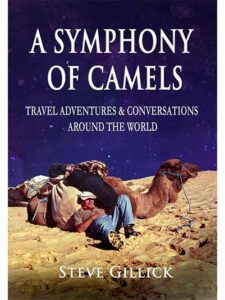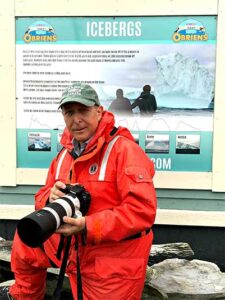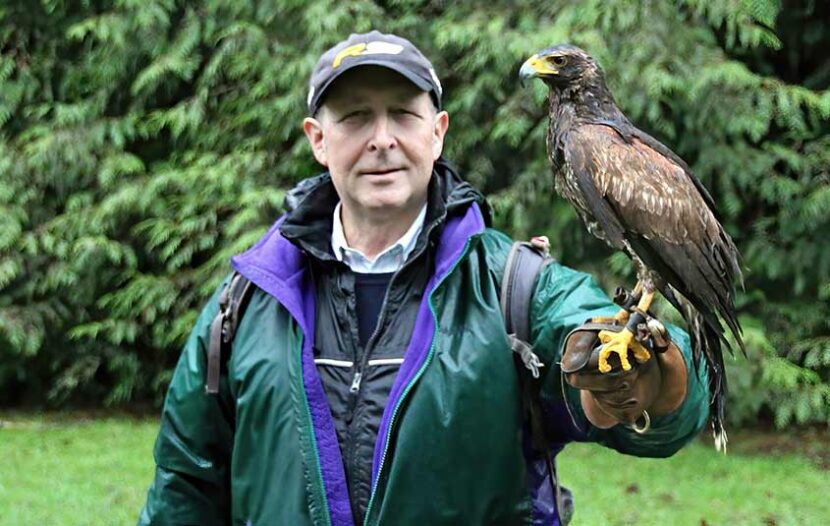TORONTO — So many people in the travel industry are told ‘you should write a book!’
Steve Gillick actually did it.
The travel industry veteran, best known for his years as President of the Canadian Institute of Travel Counsellors (CITC), is also a travel writer with 320+ articles to his name, a photographer, and since 2012 the founder and President of consultancy Talking Travel.
His introduction to travel – and incidentally, the start of his new book – came all the way back in grade 8.
Offered the chance to experience either Expo ’67 in Montreal with his classmates, or a trip to Europe as part of a student tour, Steve took the transatlantic option, travelling to England, Scotland, Denmark, Sweden, Russia, Spain, Portugal, Gibraltar and Belgium.
The cost? $599, everything included. The impact on Steve’s life? Priceless.
The five-week trip, by jet-prop, ship and motor coach, opened his eyes to the wonders of world travel, and from the age of 13, he was hooked.
Steve’s diary from his 1967 student trip to Europe was the first of many, many journals over his years of travelling, and as his tells us in this interview, he went back to those journals when he began writing his book.
 Just a few years later he was VP of an educational tour company, a formative job to start a lifelong career in travel.
Just a few years later he was VP of an educational tour company, a formative job to start a lifelong career in travel.
To date Steve has explored more than 730 destinations in 85 countries and territories, with 84 return visits.
Filled with helpful tips and insightful observations, the book is a great read for anyone who, like Steve, became fascinated with travel at an early age and has made travel their life’s work. It’s also a good recommend for clients too.
Here’s the first part of Travelweek’s Q&A with Steve; check Travelweek Daily tomorrow for the second part, including a look at the importance of travel agents in this rapidly changing world of pandemic travel.
Steve’s book can be ordered here.
What were the best things about writing your book, and the worst? And what advice would you give to others in the travel industry who think they have a book in them?
As I noted in the book, I began to write it 32 years ago. At the time, it was a mission and a challenge. One of the best things about writing it was that I proved to myself that I could finish the book. So one more item checked off on my master list of things to accomplish!
In those 32 years I encountered lots of distractions, including writing over 300 travel articles spread out in both consumer and trade publications. I was speaking at industry events, delivering seminars and webinars, and for the past 10 years, I’ve run my own consulting company, with both travel and non-travel clientele.
But also for many, I was fortunate to have a publication ‘mentor’ of sorts, who routinely asked how the book was coming along. That mentor is Steve Crowhurst, the well-known travel agent professional development guru, and author of the Sadamune Blades trilogy. So I started to get serious, if only to call Steve’s bluff that I would actually complete the book. I self-published on Amazon in November 2021. It’s a great feeling of accomplishment and fulfillment. And now I’ve started a second travel book, as well as a book on birding. So maybe I’m getting addicted!

Ready to embark on a dinghy excursion in Witless Bay, NL to photograph the puffins
The great thing about writing a book is to actually gather in writing all the adventures you’ve had. It’s a total ‘feel-great’ experience. And in my case I would start to day dream about the adventures: the porters in Nepal who taught me the Tiger-Goat game; walking up Santa Anna Volcano in El Salvador; tasting fire-fly squid in Tokyo; riding a donkey in Luxor; playing red-light, green light with the kids in an Iban long house in Borneo. And thinking … wow, I did all this. How did this make me a better person and a better traveller? What can I share about my experiences to promote travel that celebrates people, culture, education, understanding and happiness?
The worst aspect of writing was the discovery that the 89,000+ words that I had written and that I thought were perfect…were not! They say ‘the devil’s in the details’ but it’s worth it in the end.
As for advice to others in the industry…I would say, ‘go for it’. There is an old maxim that ‘if you want to be a writer, then write!’ Write an agency or company newsletter. Write a blog about your travels. Think of a theme for your book. It could be ‘My Love Affair with Tokyo’ or it could be ‘How to get the most out of your travel experiences’. Every book needs a hook on which to hang the text.
Travel advisors have a ton of experience to share from their office, customer service and travel experience. People love to read honest, first-hand travel accounts. How about ‘Confessions of a Travel Agent’? Pick a theme, set a goal to complete the book (1 year? 5 years? 32 years?) and start to gather together all those great stories that until now, you only shared with your clients and colleagues.
Were your journals instrumental in putting the book together? There must have been days when you were completely exhausted from your travels and really had to push yourself to write down the day’s events.
Absolutely! I say in the book that my first serious travel was on a school trip in 1967 where we visited nine European destinations, and I kept a detailed diary of my adventures. I still have that diary! And now I’ve added many more.
I’ve always been a proponent of travel, and I have always recorded notes about my travels so I would be able to read about them 20+ years in the future.
As a photographer, the advent of memory cards and the ability to take hundreds and sometimes thousands of photos on a daily basis, has affected my note-taking to a certain degree. I now rely on visual notes through the camera to remind myself of what I did. But I still collect business cards and obtain the emails of destination reps, tour guides, chefs and other important people I meet. It’s all part of the joy of connecting with a destination.
Many in the travel industry know you from your info sessions re: travel scams. Tips on how to avoid scams and theft while travelling are scattered throughout the book. It seems like that might make a good hook for agents to recommend the book to their clients?
I wrote a monthly column on travel scams for five years as well as published two booklets on scams (Scam Watch, and Son of Scam).
Travel scams thrive in every country. Some are quite clever. The Scam Artist watches as a new guest enters their hotel room…takes down the room number…calls the room pretending it’s the front desk…says the credit card didn’t go through so client can either return to the front desk or “I can take it over the phone and save you the trouble”. Client provides the card details. Scam Artist goes on a shopping spree.
Or the scam may be quite simple. Post office clerk sells stamps to a traveller and tells the traveller that she will affix the stamps to the postcards and mail them as a service to the client. Stamps go into the clerk’s pocket. Postcards never arrive.
And while at one point in time, curiosity about travel scams may have attracted travellers to read more about them, today I am not so sure.
Today’s travellers are looking for something else: How to connect with a destination. How to customize each travel experience to their unique needs, interests and tastes. How to make every single travel adventure a once-in-a-lifetime experience,
So I think that savvy guidance on destination connections and interactions is probably a better ‘book hook’ for agents to use. In my case, A Symphony of Camels is about absorbing the spirit of a destination through determined action. And conversations with locals are a major constituent of this spirit. Conversations provide those unique cherished memories about a destination.
Check out Travelweek Daily tomorrow for the second part of the interview, including a look at why travel agents and their years of industry experience are more important now than ever. For book ordering details click here.

